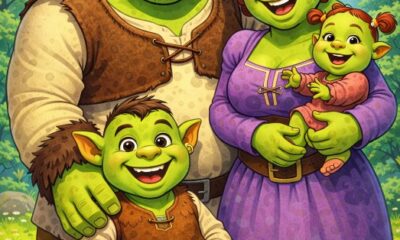Published
7 months agoon

He wasn’t there when the child was born—but he’s there for everything that comes after. That’s what makes him Dad. In cities across the country, Black men are embracing a new role in blended families. They become more than just partners.
They step in as providers, protectors, and spiritual leaders. Not out of obligation—but out of love, loyalty, and legacy. This kind of leadership doesn’t always make headlines. But in living rooms, schoolyards, and barbershops, their presence speaks louder than words.
Fatherhood isn’t defined by paternity tests. It’s defined by consistency. That’s why father figures are celebrated in Black communities today. Black men in stepfather roles show up for the hard stuff—discipline, homework, and emotional check-ins. They become trusted anchors in chaos.
Urban fatherhood often requires stepping into households shaped by trauma, grief, or abandonment. Still, these men bring hope and healing. They are not replacements. They’re reinforcements—building futures and restoring trust with every hug, lesson, and second chance they give.

Black women know the difference between a man who visits and a man who’s rooted. Respect grows where consistency lives. These men take on the challenge of loving children not of their blood—but of their heart. That love is powerful.
When a Black man chooses to help raise someone else’s child, he’s not trying to erase the past he’s investing in the future. He becomes Dad by showing up. By holding space. By setting the standard. And Black women see the strength in that daily.
Stepfather stories of strength are often missing from our cultural conversations—but they’re alive in neighborhoods across America. These men do more than step in. They rise up, lead prayer before dinner, and they drive to every school recital.
They defend, uplift, and guide young people through stages of life they once faced alone. Man stepdads rewrite the narrative of abandonment. Their legacy isn’t in DNA—it’s in how they treat the people who depend on them. That’s what makes them unforgettable.
Q: What’s the difference between a father and a dad?
A: A father can be biological. A dad consistently shows love, leadership, and loyalty—even without a blood connection.
Q: How do Black men support blended families?
A: They show up as father figures, offer protection, emotional support, and help rebuild trust where others once left.
Q: Why do Black women respect stepfathers?
A: Because these men love children that aren’t biologically theirs—and they do it without needing praise or permission.
Q: What does fatherhood in Black communities look like today?
A: It’s diverse—biological dads, bonus dads, and mentors who step in to lead families with heart and honor.
Q: Can non-biological father figures make lasting impact?
A: Absolutely. They shape values, inspire confidence, and bring emotional stability that helps children thrive long-term.
Joseph Collins CEO of Urban Television Network Corp.



Single Men & Step-Fatherhood: Crucial Considerations Before Taking the Plunge
Jesse Jackson Dies at 84: Civil Rights Icon’s Legacy


Indie Media’s Rise How They Thrived Before Venture Capital’s Diversity Push


Minority Births Surpass White Births: A Demographic Shift Impacting America


Hot Girl Summer: Your Guide to Confidence, Fun, and Intentional Living


Shrek as a Cautionary Tale: Unmasking the Ogre’s Life Lessons